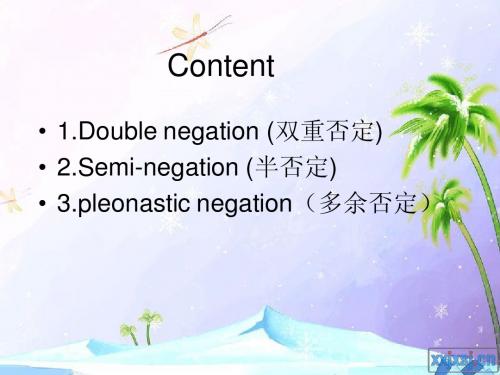英语否定转移翻译ppt课件
- 格式:ppt
- 大小:78.00 KB
- 文档页数:14
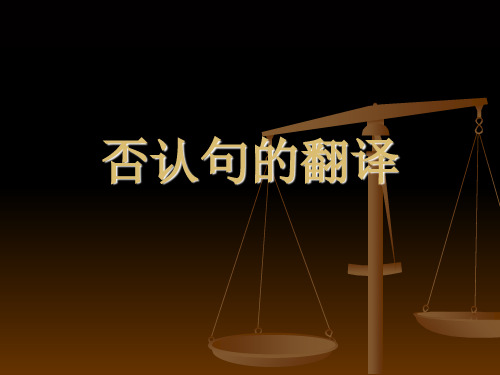
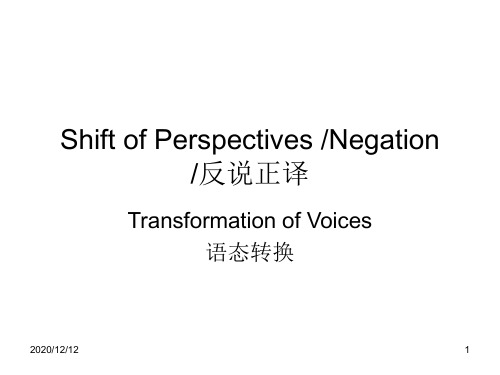

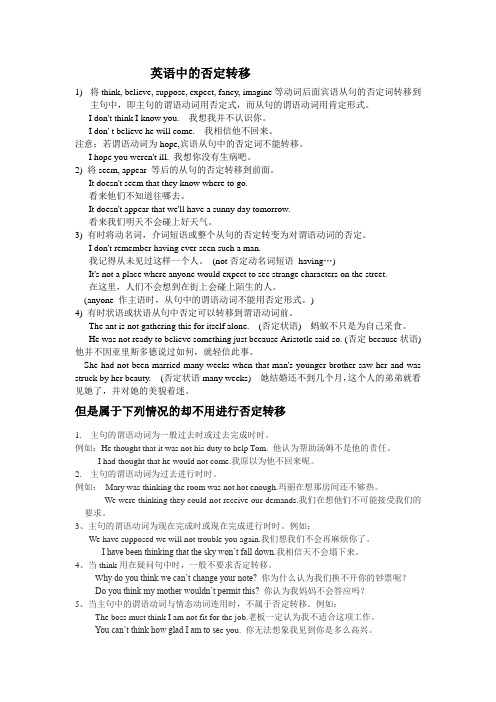
英语中的否定转移1)将think, believe, suppose, expect, fancy, imagine等动词后面宾语从句的否定词转移到主句中,即主句的谓语动词用否定式,而从句的谓语动词用肯定形式。
I don't think I know you.我想我并不认识你。
I don' t believe he will come.我相信他不回来。
注意:若谓语动词为hope,宾语从句中的否定词不能转移。
I hope you weren't ill. 我想你没有生病吧。
2) 将seem, appear 等后的从句的否定转移到前面。
It doesn't seem that they know where to go.看来他们不知道往哪去。
It doesn't appear that we'll have a sunny day tomorrow.看来我们明天不会碰上好天气。
3) 有时将动名词,介词短语或整个从句的否定转变为对谓语动词的否定。
I don't remember having ever seen such a man.我记得从未见过这样一个人。
(not否定动名词短语having…)It's not a place where anyone would expect to see strange characters on the street.在这里,人们不会想到在街上会碰上陌生的人。
(anyone 作主语时,从句中的谓语动词不能用否定形式。
)4) 有时状语或状语从句中否定可以转移到谓语动词前。
The ant is not gathering this for itself alone.(否定状语)蚂蚁不只是为自己采食。
He was not ready to believe something just because Aristotle said so. (否定because状语) 他并不因亚里斯多德说过如何,就轻信此事。
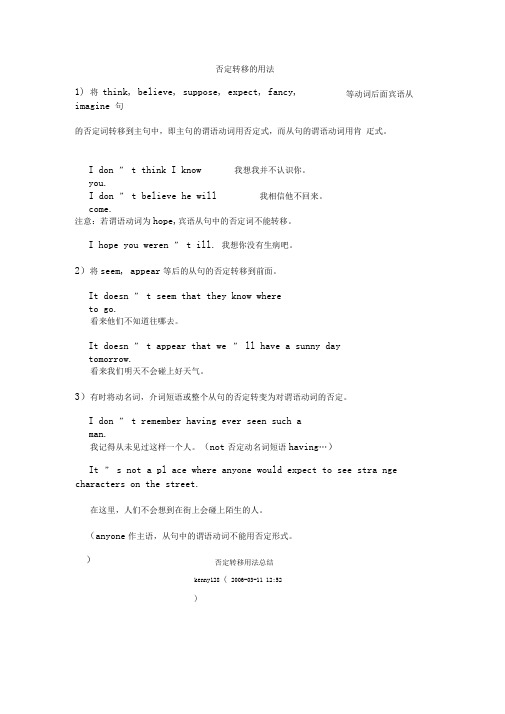
否定转移的用法1) 将think, believe, suppose, expect, fancy,等动词后面宾语从imagine 句的否定词转移到主句中,即主句的谓语动词用否定式,而从句的谓语动词用肯疋式。
I don ” t think I know我想我并不认识你。
you.I don ” t believe he will我相信他不回来。
come.注意:若谓语动词为hope,宾语从句中的否定词不能转移。
I hope you weren ” t ill. 我想你没有生病吧。
2)将seem, appear等后的从句的否定转移到前面。
It doesn ” t seem that they know whereto go.看来他们不知道往哪去。
It doesn ” t appear that we ” ll have a sunny daytomorrow.看来我们明天不会碰上好天气。
3)有时将动名词,介词短语或整个从句的否定转变为对谓语动词的否定。
I don ” t remember having ever seen such aman.我记得从未见过这样一个人。
(not否定动名词短语having…)It ” s not a pl ace where anyone would expect to see stra nge characters on the street.在这里,人们不会想到在街上会碰上陌生的人。
(anyone作主语,从句中的谓语动词不能用否定形式。
)否定转移用法总结kenny128 ( 2006-03-11 12:52)有感于课文中一句话的理解)山东高唐一中刘长友外研版的新课标英语课本第二册Module 1 “Zhou K ai (2) p2中有这样一句话:I think I don ' t get these things because I take a lot of exercise and am very fit.不少有学有基础的学生,其中包括一些老师,对这一个句子中,该不该用否定转移的句子,展开了激烈讨论。

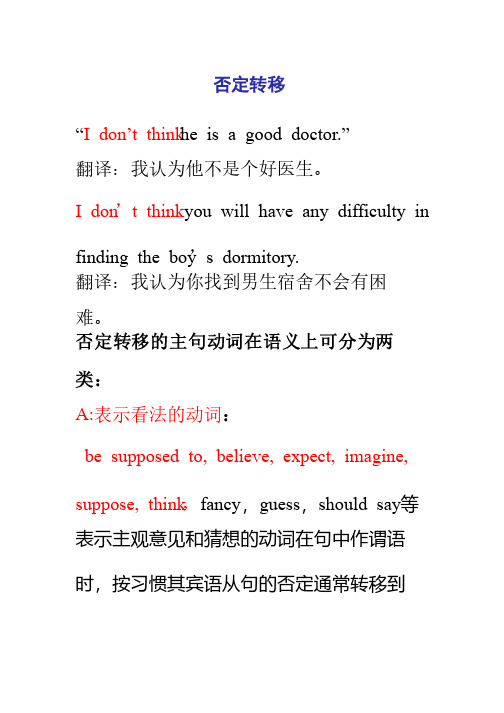
否定转移 “I don’t think he is a good doctor.” 翻译:我认为他不是个好医生。
翻译:我认为他不是个好医生。
you will have any difficulty in I don’t think y ou will have any difficulty in finding the boy’s dormitory. 翻译:我认为你找到男生宿舍不会有困难。
难。
否定转移的主句动词在语义上可分为两类:A:表示看法的动词: be supposed to, believe, expect, imagine, suppose, think,fancy,guess,should say等表示主观意见和猜想的动词在句中作谓语时,按习惯其宾语从句的否定通常转移到主句。
如:如: you before. didn’t think I have seen you before. 1. I didn’t imagine that we would say 2. She anything. 1. The baby doesn’t appear to be awake. 2. It doesn’t look (看起来) like i t’s it’s (天不会)going to rain.3.English doesn't seem easy to learn. 英语好像不容易学。
学。
4.It didn't seem during those years that there could be anyone else who might share my own peculiar tastes. 在那些年月里,似乎没有人会有我这样的特殊情趣。
那些年月里,似乎没有人会有我这样的特殊情趣。
类似的情况还有半助动词happen 。
例如:He didn't happen to be at home. be at home. 他碰巧不在家。

